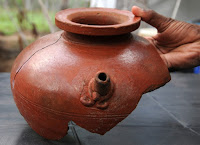 |
| A broken pottery |
 |
| A ring well with brick structures |
The Archaeological Survey of India
has unearthed an Harappa like site near Madurai
in a sleepy village called Keezhadi in Sivagangai district .The finds dates
back to 1st century, another astounding proof, for the antiquity of Tamil and
the Tamils. It must be remembered that the ancient 'Ten Madurai' was the seat of
Tamil Sangam Age. Keezhadi village is located near Silaiman, a border town
between the Madurai
and Sivagangai districts. It is believed the Tamil Brahmi inscriptions on the
potteries excavated from here, had Sangam age Tamil names like Thisan, Aadhan and Udhiran.
Historians and archaeologists say the findings are stupendous and it could very
well push back the history of ancient Madurai
at least by a millennium. This again goes to prove the oldest and ancient most
city of the world is Madurai .
The ASI had already identified nearly 293 Sangam Age towns along the course of
river Vaigai from its origin in Theni district up to the very end of the river in the
Ramanathapuram district.
Amarnath of ASI believes this could be a very old settlement of educated people
who had trade links with Rome .Strikingly it corroborates with the findings of
Poompukar and the great Tamil classic 'Chilpathikaran' of the Tamil Sangam Age.
Amarntath goes on to mention “Keezhadi could as well be the ‘Peru Manalur’, the
city of Sangam Pandiyas
mentioned in literature”. Mr. Rajesh Assistant Archaeologist says “The level of
sophistication can be gauged from luxury and pastime items like the ivory dice,
a game of an elite society,” .Senior epigraphist V. Vedachalam, domain expert
for the excavation, says the excavations and findings prove Tamil Nadu had a unique
culture during the Sangam period and the excavation site is of abundant social,
political and commercial significance. Existence of river valley civilisations
in Tamil Nadu is proved. Archaeologists are confident that Keezhadi will emerge
as an “index site” to determine the culture of people living between Sangam and
post-Sangam periods.
ASI officials believe the ancient
settlement at the village, was on the highway traveled by traders from all
over the world at one point of time. This site had underground drainage system
which was on par with the Harappan system. The sewage drains had been laid with
"baked clay pipe lines". The officials also felt the signs of urban
civilisation are much more advanced than Kaveri Poompattinam. Sangam period Tamil literary works like
Paripadal, Nedunalvaatai and Madurai Kanchi describes in detail about the personal lives of kings and queens, their palaces and the way they lived .These
archaeological findings which relate to approximately 3000 year old history
throws light on the literary
descriptions and corroborates to the literary evidence. More than 3000 artifacts
have been excavated from the sites. All of them corroborate to the literary
descriptions.
Already two phases of the excavations are over
.The third phase is still on and will continue up to September this year.

thnk you for publishing a brilliant article. I am a long time reader,but I have never actually left a comment. I have bookmarked your blog and shared this on my Facebook. Thanks again for a quality post
ReplyDeleteThanks .
ReplyDelete